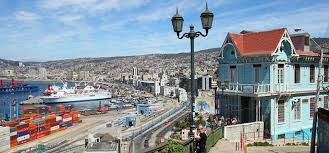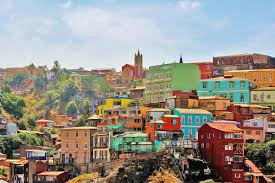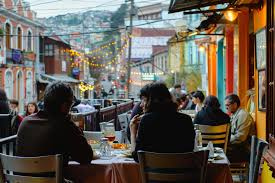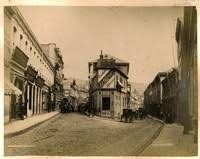What is the story behind Valparaíso’s name?

What is the story behind Valparaíso’s name?
What is the story behind Valparaíso’s name? The Story Behind Valparaíso’s Name: A Historical Journey.
Valparaíso, a vibrant port city in Chile, is renowned for its stunning architecture, colorful hills, and rich cultural heritage.
But have you ever wondered about the story behind its name? The origins of Valparaíso’s name reflect the city’s history, geography, and the diverse influences that have shaped its identity over centuries.
This exploration will delve into the etymology of Valparaíso, its historical significance, and the legends surrounding its unique name.

The Etymology of Valparaíso
The name “Valparaíso” is derived from the Spanish words “valle” and “paraíso,” which translate to “valley” and “paradise,” respectively.
This name captures the picturesque beauty of the area, surrounded by lush hills and overlooking the Pacific Ocean.
The full original name of the city was “Valparaíso de los Reyes,” meaning “Valley of Paradise of the Kings.” This name was intended to honor the Spanish Crown and its dominion over the newly discovered lands.
The beauty of the region inspired its founders to associate it with paradise, a fitting description for a place known for its stunning landscapes.
This combination of terms reflects the geographical features of the region, highlighting the valley-like terrain and the natural beauty that captivated early settlers.
The name resonates with the idyllic qualities that continue to attract visitors to Valparaíso today.
The Historical Context
Valparaíso’s history dates back to the indigenous peoples who inhabited the region long before the arrival of the Spanish. The Mapuche and other native groups recognized the area’s natural resources and strategic location.
In 1536, Spanish explorer Juan de Saavedra was among the first Europeans to visit the area. However, it wasn’t until 1544, when Pedro de Valdivia established a settlement, that Valparaíso began to take shape as a port.
As the city developed, its strategic location along the Pacific coast made it a key port for trade and commerce, especially during the Spanish colonial period.
Valparaíso quickly became a vital link between the Pacific and the Atlantic, facilitating the exchange of goods and ideas.
The Role of Spanish Influence
The Spanish influence on Valparaíso’s name and identity is significant. The city’s foundation was rooted in Spanish colonial ambitions, and its name reflects the grandeur associated with the monarchy.
During the colonial period, Valparaíso served as a port for Spanish galleons transporting treasures from the Americas back to Spain.
The name “Valparaíso de los Reyes” emphasized the importance of the city as a royal port and a hub of wealth and power.
Over time, Valparaíso evolved into a cosmopolitan center, attracting immigrants from various backgrounds, including Europeans, Asians, and Middle Easterners.
This diverse influx of people further enriched the city’s cultural tapestry, contributing to its unique identity.
The Symbolism of the Name
The name Valparaíso symbolizes more than just geographical features; it embodies the city’s spirit, resilience, and cultural richness. The term “paradise” reflects the breathtaking views of the hills, the colorful houses, and the vibrant streets that characterize the city.
Valparaíso has long been celebrated for its artistic communities, music, and cultural events, creating a dynamic atmosphere that resonates with the idea of a paradise for creative expression.
The city’s name serves as a reminder of its beauty and the inspiration it has provided to countless artists and writers throughout history.
Furthermore, the name Valparaíso reflects the city’s ability to adapt and thrive despite challenges, including economic fluctuations and political upheaval.
The enduring charm of Valparaíso continues to attract visitors and residents alike, reinforcing its status as a paradise in the hearts of many.
Local Legends and Folklore
The story behind Valparaíso’s name is intertwined with local legends and folklore. One popular legend tells of a group of Spanish sailors who, upon discovering the bay’s beauty, declared it a paradise fit for a king.
As the tale goes, the sailors were enchanted by the region’s lush landscapes, sparkling waters, and favorable climate, prompting them to name the area Valparaíso.
This legend illustrates the profound impact that the natural beauty of Valparaíso had on early settlers and explorers.
Another story involves a local saying: “Valparaíso, el puerto de los sueños,” meaning “Valparaíso, the port of dreams.”
This saying reflects the city’s role as a gateway for dreams and aspirations, a place where possibilities abound.
The Evolution of the Name
Over the years, the name Valparaíso has undergone various changes, often reflecting political and social shifts in the region. While the name “Valparaíso de los Reyes” fell out of use, the city has maintained its identity as Valparaíso.
In the 19th century, as Chile gained independence and transformed into a republic, Valparaíso became a symbol of national pride and progress.
The city evolved into a center of trade, culture, and politics, further solidifying its place in Chilean history.
The evolution of the name from its colonial roots to its modern identity mirrors Valparaíso’s transformation from a royal port to a vibrant urban center, showcasing its resilience and adaptability.
The story behind Valparaíso’s name
The story behind Valparaíso’s name is a captivating journey through history, culture, and geography. Derived from Spanish terms that evoke images of beauty and paradise, Valparaíso embodies the essence of this coastal city.
From its origins as a royal port to its status as a cultural hub, Valparaíso’s name reflects the diverse influences that have shaped its identity over centuries.
The legends and folklore surrounding the name enhance its significance, making Valparaíso not just a place on a map but a cherished symbol of beauty and creativity.
As you explore the vibrant streets and colorful hills of Valparaíso, remember the story behind its name, which captures the spirit of a city that continues to inspire and enchant all who visit.





Leave a Reply